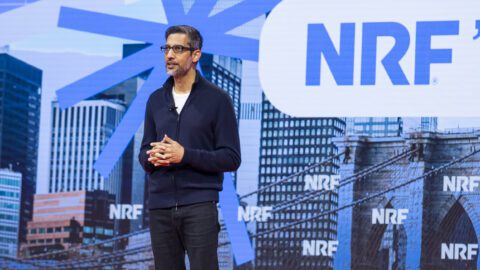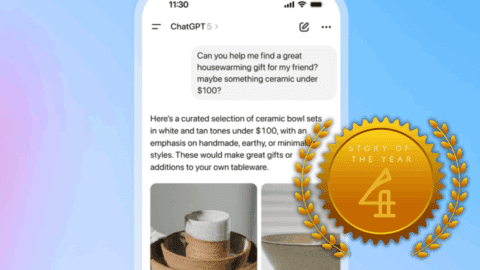Today’s mobile technology barely touches the tip of the iceberg in terms of the impact it will have on our lives, much less the retail industry, noted David Gruehn, Retail And Hospitality Industry Managing Director for Microsoft, during a 2011 tekSESSIONS conference presentation on December 7, 2011. Retailers must determine and seize the opportunities being presented ― or become mobility road kill, he noted.
Gruehn told attendees that mobile usage is evolving swiftly, bandwidth is growing, devices are getting smarter and apps are exploding. As they do so, the bridge between the digital lifestyle and digital workstyle is blurring to complete nonexistence.
The phone will become the new browser, Gruehn asserted. Within the next three years, “more people will access the Internet through their phones than through their PCs. Though today web browsing starts in the home, it is extending quickly through mobile devices into other channels…This is why Microsoft spent billions of dollars and made almost nothing on an investment called Internet Explorer: It’s real estate, and real estate is valuable,” said Gruehn.
In the same way, companies including Microsoft and Google are spending billions of dollars on free apps with amazing capabilities and urging people to opt in. Why? Because having personal relationships with consumers is very powerful and valuable to retailers, and one of the most personal possessions those consumers own is their mobile phone. “Ultimately mobile will allow retailers to establish one-on-one relationships ― but it’s an art that a lot of people are still [unraveling],” Gruehn noted.
Tesco Pilots Personal Kiosk With Microsoft
As Gruehn urged retailers to think outside of the box, he pointed to Tesco, the global grocery giant with whom Microsoft is piloting a mobile Shopkick-like personal kiosk. He noted Tesco’s novel approach to gaining market share in South Korea but without increasing number of stores. In its innovative network of virtual stores, called Home Plus, Tesco now brings its grocery offerings to places where busy people are found waiting.
Shoppers are able to access the mobile kiosk in subway stations, where merchandise is displayed on the stations’ glass walls similarly to how it is presented in a physical store. The difference? South Koreans use their smartphones to shop: they scan a product’s QR code, the item lands in an online cart, and purchases are delivered to the shopper’s doorstep. After the roll-out, online sales increased 130%, Gruehn reported. Tesco became Number One in the online market and today is a very close second offline.
Through The Mobile Looking Glass
During the session Gruehn shared a video explaining Microsoft’s view of mobile technology in 2021, which includes: face recognition in public places, wayfinding on public signage, real-time speech translation, wearable computing, speech to text translation, seamless integration with LOB apps, and more.
“We will see clothes and glasses with the ability to translate foreign speech in real time, digital paper, any surface capable of projecting images, and the ability to connect with your world ― your lifestyle, workstyle and the people you love ― in the cloud,” Gruehn noted. “Mobile technology will provide more conveniences, such as monitoring your patterns and knowing when your plane lands then contacting your hotel with status.”
Gruehn asserted that mobility quickly is taking retail to another level, and that merchants need to grasp it, not shy away. He added that mobile advances are coming at twice the speed than five years ago and that retailers need to open their minds and embrace them. “For those retailers who are afraid of technological advances in mobility, who don’t embrace it, these concepts may take you out,” he forewarned.
The Microsoft Marketplace
While Microsoft helps retailers link to consumers from the first connection point, typically search, across all retail touch points, including home, mobile, store, and associates — a new channel has emerged: “Xbox, the experience hub,” said Gruehn. He noted that when retailers ask him why they should care about Xbox, he tells them: “How about the 36 million males between the ages of 18 and 40 that are on the system every night? That’s opportunity!” Gruehn points to Xbox Kinect: “Don’t think we spent tens of billions of dollars on an unbelievable technology just to play games on a $150 console.”
Gruehn went on to describe the next version of Windows. When Windows 8 comes out, he noted: “For the first time, we will have the same user interface on PCs, tablets, phones and any other device that lets us connect with the world in a mobile way. It’s rumored that we may see Windows Phone 8 ported to the NT kernel, providing a common kernel OS across all those devices.” He said developers especially are excited about writing once for several different channels.
Gruehn also mentioned the newest version of the Lync communications server, which is like “IM on steroids,” he noted. “Lync for mobile phones allows me to share PowerPoint presentations while on a conference call and actually run that presentation through my mobile device. That’s pretty powerful: this bridge between digital worlds ― the digital lifestyle and digital workstyle ― is blurring to complete nonexistence.”












